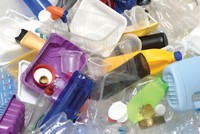Advertisement
Grab your lab coat. Let's get started
Welcome!
Welcome!
Create an account below to get 6 C&EN articles per month, receive newsletters and more - all free.
It seems this is your first time logging in online. Please enter the following information to continue.
As an ACS member you automatically get access to this site. All we need is few more details to create your reading experience.
Not you? Sign in with a different account.
Not you? Sign in with a different account.
ERROR 1
ERROR 1
ERROR 2
ERROR 2
ERROR 2
ERROR 2
ERROR 2
Password and Confirm password must match.
If you have an ACS member number, please enter it here so we can link this account to your membership. (optional)
ERROR 2
ACS values your privacy. By submitting your information, you are gaining access to C&EN and subscribing to our weekly newsletter. We use the information you provide to make your reading experience better, and we will never sell your data to third party members.
Sustainability
Plastics industry launches waste initiative
Chemical companies, others will spend up to $1.5 billion to tackle ocean plastics
by Alexander H. Tullo
January 17, 2019
| A version of this story appeared in
Volume 97, Issue 3

In what is being billed as the largest-ever effort of its kind, 28 companies have formed the Alliance to End Plastic Waste, which plans to invest up to $1.5 billion over the next five years on projects to keep plastic trash out of the ocean.
Alliance to End Plastic Waste at a glance
▸ Financing: Up to $1.5 billion over five years
▸ Aim: To establish waste infrastructure and recycling of plastics, primarily in the developing world, to mitigate ocean waste
▸ Partner chemical companies: BASF, Braskem, Chevron Phillips Chemical, Clariant, Covestro, Dow Chemical, DSM, ExxonMobil, Formosa Plastics USA, LyondellBasell Industries, Mitsubishi Chemical, Mitsui Chemicals, Nova Chemicals, Occidental Petroleum, PolyOne, Reliance Industries, Sabic, Sasol, SCG Chemicals, Shell, Sumitomo Chemical, Total, and Versalis
▸ Other companies: Berry Global, Henkel, Procter & Gamble, Suez, Veolia
▸ Other organizations: Circulate Capital, National Geographic Society, Renew Oceans, World Business Council for Sustainable Development
The alliance includes some of the world’s largest chemical companies, including BASF, Dow Chemical, and LyondellBasell Industries, as well as consumer product giants like Procter & Gamble and Henkel. But critics say the industry should have acted on plastic waste sooner and that this effort by itself won’t solve the problem.
The initiative launched with a sleek video presentation viewed on the web by more than 500,000 people its first day. It featured British television presenter Hannah Vaughan Jones in a roundtable discussion with CEOs such as Dow’s Jim Fitterling, P&G’s David S. Taylor, and LyondellBasell’s Bob Patel.
“I think everyone agrees that plastic waste does not belong in the ocean or the environment, and this demands swift action and leadership from all of us,” Taylor said.
The initiative will emphasize waste infrastructure, recycling, and other programs in developing countries, where it believes the investment will have the most impact. The alliance cites a 2017 study in Environmental Science and Technology saying that between 88 and 95% of river-borne plastics originate from just 10 rivers in Asia and Africa (DOI: 10.1021/acs.est.7b02368). It also cites work by the Ocean Conservancy suggesting that more than 60% of ocean plastics come from just five countries: China, Indonesia, the Philippines, Thailand, and Vietnam.
The alliance will work with local jurisdictions to establish waste collection and disposal. It will engage in education and cleanup efforts. And it will help develop recycling and energy-recovery technologies.
Among the initiatives the alliance will support is Renew Oceans, an affiliate of the plastic-to-fuels start-up Renewlogy. Next year, Renew Oceans plans to deploy special fencing in India’s Ganges River to collect a portion of the 550,000 metric tons of waste dumped into the river each year.
It will also fund the Incubator Network, which was set up by Circulate Capital and SecondMuse to provide “catalytic capital” to entrepreneurs to reduce the risk of waste-reduction investments.
The alliance marks a shift from the old attitude that plastic waste is the responsibility of consumers, says Conrad MacKerron, senior vice president of the advocacy group As You Sow. “It’s a change in that it shows the petrochemical industry is acknowledging some initial financial responsibility for cleaning up the mess created by plastics packaging waste,” he says.
Yet MacKerron notes that the alliance stands in “sharp contrast” to the Ellen MacArthur Foundation’s New Plastics Economy Global Commitment, launched in October and joined by some 250 companies and organizations, including his. The alliance doesn’t call for a reduction in the use of single-use plastics, as the commitment does. It also endorses energy recovery, which the commitment shuns in favor of reuse and mechanical recycling. He notes that a few companies in the alliance, such as Dow and P&G, were absent from the commitment.
Advertisement
Dianna Cohen, CEO of the Plastic Pollution Coalition, an environmental group, has harsher words. “This announcement from the industry is too little, too late,” she says. “Plastic production is slated to increase by 40% over the next decade. Recycling fails to address the problem, and single-use plastic is filling our waterways, oceans, and environment.”




Join the conversation
Contact the reporter
Submit a Letter to the Editor for publication
Engage with us on Twitter